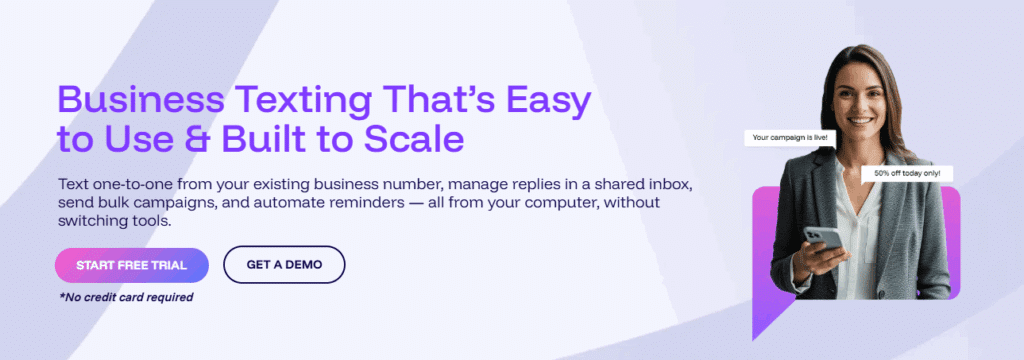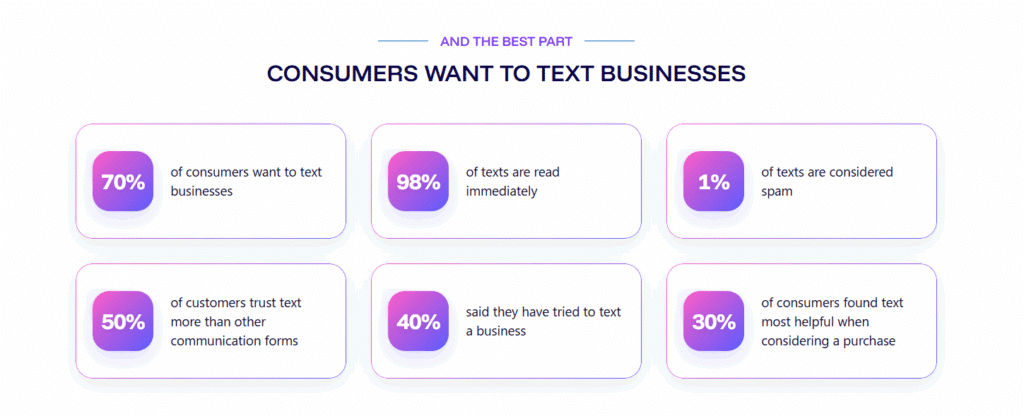
How to Use B2B SMS Marketing for Effective Lead Generation
Every day, businesses negotiate deals, establish partnerships, and share important updates. Therefore, being able to communicate quickly is a must for smooth operations and stronger relationships.
With SMS, you can send a brief text that your partners and clients read almost immediately.
But results don’t just come from sending texts. The impact of your SMS outreach depends on the platform behind it.
The best SMS marketing platform should support automation, personalization, and seamless integration with your existing business systems.
In this guide, we’ll show you where texting fits into your communication workflows and how to build an effective B2B SMS marketing strategy that supports faster outreach.
What Is B2B SMS Marketing?
B2B (Business to Business) SMS marketing refers to the use of Short Message Service (SMS) to promote products or services from one business to another.
Unlike B2C SMS marketing, which targets consumers, B2B focuses on business clients and partners. It’s used to confirm meetings, follow up on demo requests, send relevant content, and keep deals moving forward.
What sets B2B SMS apart is its focus on personalization and timing. Messages are short and intentional, and are sent at key moments like post-webinar follow-ups, sales handoffs, or account check-ins.
Because text messages are brief, targeted, and mobile-first, they lead to stronger engagement and better click-through rates.
That’s why many sales teams are choosing to start texting as part of their outreach. It helps them reach prospects faster and close sales.
How to Build a B2B SMS Marketing Strategy
Crafting effective B2B texting campaigns involves more than just sending out messages. Here’s how you can ensure your SMS campaigns are impactful and engaging:
Understand Your Audience
An effective B2B SMS communication strategy begins with knowing who you’re communicating with.
Start by performing an SMS segmentation based on relevant business traits: job function, company size, industry, stage in the funnel, or past engagement.
A sales director may want to cut straight to scheduling a meeting, while an operations lead might respond better to a short update on how your product improves workflow.
The more specific your segments, the more relevant content your messaging can deliver.
Tone also matters. In B2B, you’re communicating with decision-makers who value purpose. Messages should be respectful of their time, personalized when appropriate, and connected to a business goal.
Set Clear Objectives
Before sending marketing messages, your team needs to know what success looks like. Objectives shape everything from the tone of your messages to the timing of your campaigns.
In B2B SMS marketing, objectives can vary based on your role, campaign type, or place in the customer journey. You might aim to:
- Generate more qualified leads from inbound form submissions
- Increase attendance at webinars or scheduled demos
- Reduce no-show rates for sales calls
- Improve response times during the onboarding process
- Re-engage dormant accounts or clients nearing renewal
Each of these objectives ties back to marketing purposes, whether that’s driving engagement, accelerating decision-making, or improving client retention.
For example, if your goal is to boost demo attendance, your campaign should include reminder messages tied to the meeting time. If you’re focused on lead qualification, you’ll want messages that ask direct questions or guide the contact to the next step.
Personalize Your Messages
You can incorporate details such as their first name, company name, or recent interactions with your business into the messages. This simple step helps nurture relationships and create a personal connection that’s more direct than generic broadcast messaging.
For example, a message that starts with “Hi [First Name], here’s a special offer just for [Company Name]!” immediately grabs attention and shows that the message is tailored specifically for the recipient.
Beyond using names and company details, personalization can also be about timing and relevance. You can send messages based on where each client is in the business cycle or according to their past purchasing behavior.
If a client recently purchased a software license, a follow-up SMS asking about their experience or offering help with setup could reinforce trust and strengthen relationships.
Keep Messages Concise and Clear
Although modern SMS platforms aren’t strictly limited to 160 characters, it’s still important to keep messages short and to the point.
You should avoid using complex industry jargon or overly technical terms unless your target audience commonly understands them. Instead, use simple language that directly communicates what you want your business contacts to know.
Including images with your messages can also help you provide more details while keeping messages concise. With MMS, you can send branded images, product screenshots, documents, or short videos that support your message.
For example, sharing a chart, pricing overview, or product update through an image can make complex information easier to absorb.
It also adds polish to your outreach, especially when you’re communicating with executives or stakeholders who prefer quick visual context over long explanations.
Time Your Messages Appropriately
Timing is crucial in B2B SMS marketing. The goal is to reach your audience when they’re most likely to see your message, have a moment to respond, and act on it.
Generally, the best time to send marketing messages is on weekdays during business hours, which tend to perform best.
Late mornings and early afternoons are also ideal when people are between meetings and not yet wrapping up for the day.
You need to avoid sending texts early in the morning, late in the evening, or on weekends unless the context clearly calls for it. You also want to consider the recipient’s time zone and role.
An automated texting software helps you schedule messages based on local time zones and preferred contact windows, so you’re always reaching out when it counts. You can set automation to align with form submissions, meeting confirmations, or campaign workflows.
Include a Call-to-Action (CTA)
Every SMS should include a clear call-to-action that is easy to understand and concise.
If you want clients to check out a new product, your CTA could be, “Click here to explore our latest product features!” It works well when promoting product launches or sharing important messages with high-value contacts.
Also, you have to position your CTA prominently within your message. It should be placed at the end of the message to emphasize its importance after the recipient has read the information.
Moreover, you need to limit your SMS to one CTA. Having multiple calls to action can confuse your recipients and dilute the effectiveness of your message.
If you need to convey multiple actions, consider using text templates and sending them in separate messages spaced over time. This method is helpful when you’re trying to drive sales or convert new customers.
Automate SMS Campaigns
Manual outreach doesn’t scale when your team is managing hundreds of leads, follow-ups, and client touchpoints. You need an SMS business solution like Textellent to automate various aspects of your B2B communications.
Textellent provides automation capabilities that allow you to schedule and send a series of SMS messages through drip campaigns. This is useful for setting up appointment reminders, promotional announcements, or regular updates.
Also, this texting platform can integrate with your existing CRM system to personalize messages based on specific details of your clients. You could customize direct messages with the client’s name, last purchase, or any relevant information that makes the SMS feel tailored and direct.
Finally, Textellent allows for detailed tracking and analysis of your SMS campaign’s effectiveness. You can see which messages are engaging and converting well and adjust your strategy as needed.
Stay Compliant
SMS compliance not only protects your business legally but also builds trust with your clients.
Sending messages without this explicit permission puts your business at risk of violating compliance laws such as the Telephone Consumer Protection Act (TCPA).
You need to ensure that all marketing-type messages are only being sent to those who have provided explicit consent to receive such communication. This could be either during onboarding or through an opt-in checkbox on forms.
You’re expected to provide an easy way for recipients to opt out of receiving messages at any time. This is usually done by including a simple “text STOP to unsubscribe” message in your SMS.
Not only is this a legal requirement, but it also helps reduce complaints and prevents your messages from being flagged by spam filters or diverted into spam folders.
Monitor, Measure, and Optimize Campaigns
Sending messages without tracking performance leaves your team guessing about what’s working and what needs to improve. With the right SMS marketing tools, you can continuously refine your texting approach and align it with your goals.
Start by tracking core metrics such as delivery rate, open rate, response rate, and click-throughs. These indicators show how well your messages are landing and whether they’re prompting action.
If response rates are low, your message content, timing, or targeting may need adjustment. If open rates drop, your contact list may be outdated, or your message preview isn’t grabbing attention.
It’s also ideal to go beyond surface-level stats. You can tie your SMS activity to real business outcomes, such as booked meetings, completed demos, or closed deals.
It helps you understand how SMS contributes to your funnel, not just how many replies you received.
Shorten Sales Cycles With Targeted Messaging With Textellent!
Business relationships are built on follow-through, responsiveness, and consistent touchpoints. If your team struggles to keep up with leads or stay connected to clients, it’s time to speed up how you communicate.
With Textellent, you can automate follow-ups, send timely reminders, and personalize outreach at every stage of the customer journey. Your team stays organized, responsive, and in control without chasing emails or juggling manual tasks.
If your goal is to close more deals, strengthen client touchpoints, and stay consistently visible throughout the sales process, Textellent gives you the SMS tools to make it happen.

Sign up for a free trial or book a demo with Textellent today to see how business texting can transform the way your team communicates!
Why Instant Communication With Prospects and Clients Matters
When a prospect reaches out, they’re usually exploring multiple options. Being the first to respond determines who gets the meeting, the follow-up, and eventually the deal.
According to Lead Connect, 78% of buyers purchase from the vendor that responds first. In that short window, you are not just competing on product or pricing. You are also competing on responsiveness.
Yet, despite this urgency, most companies are slow to reply. The average email response time is over 12 hours. That delay creates a gap between interest and action, which also opens the door for competitors.
SMS business marketing changes that dynamic. With 98% open rates and 90% of texts read within three minutes, texts reach your audience faster than any other channel.

When you leverage SMS as part of your outreach, your message gets delivered and read almost instantly, increasing the chance of a timely reply.
Textellent makes all of that easy. With built-in SMS automation, CRM integrations, appointment reminders, and SMS scheduling, your team has everything needed to turn fast communication into real results.
Sign up for a free trial or book a demo with Textellent today!
Best Times to Use SMS in B2B Marketing
Using text message marketing in your B2B communication strategy works best when timing aligns with intent. Some of the most successful SMS marketing examples involve reaching prospects at critical moments.
Below are some of the most valuable points in the buyer and customer lifecycle where SMS adds a measurable impact.
Pre-Sales and Lead Qualification
The moment a lead shows interest is when they’re most open to a conversation. When someone requests a demo or downloads gated content, they expect a response.
SMS helps your team acknowledge a prospect’s interest, ask a qualifying question, or offer a quick call. This creates a smoother handoff to sales efforts and reduces the chances of the lead losing interest.
Texting also makes it easier to manage lead volume without losing personalization. Automated replies can be triggered based on form submissions, while personalized follow-ups can be handled by sales reps when needed.
With Textellent, you can launch Speed-to-Lead campaigns that automatically send contextual text replies the moment a form is submitted. These replies can thank the prospect, invite them to share more about their needs, or ask a simple qualifying question.
Over 50% of prospects will engage further when prompted by text. That quick exchange helps prequalify leads before a sales rep even gets on a call.
Event Promotions and Webinars
SMS is an effective channel for driving attendance. It’s ideal for promoting registration, sending reminders, and sharing last-minute event details.
Invites sent through email marketing tend to go unnoticed, especially when inboxes are full. Texting gives you a direct way to promote events, boost registration, and keep attendees informed.
SMS event marketing can highlight the value of your event, share a registration link, or announce a speaker your audience cares about. Promotional texts are more effective during the final days leading up to the event, when decisions are being made quickly on mobile phones.
Reminders for Meetings or Demos
Many times, no-shows happen not because of a lack of interest, but because busy professionals forget or get pulled into last-minute changes. SMS reminder helps reduce those missed appointments and keeps conversations on track.
An appointment reminder sent a few hours before a scheduled call or demo allows your contact to confirm, reschedule, or ask questions. This improves attendance rates and shows your team is organized and respectful of the client’s time.
Upsell or Cross-Sell Opportunities
Existing clients are your best source for new revenue. They already know your brand, understand your product, and have a working relationship with your team.
Texting helps you spark interest in additional offerings. A message highlighting a service tier or exclusive offer can prompt a quick reply and generate more clients from your existing customer base.
These messages are also most effective when tied to specific triggers. If a customer’s usage increases, or a renewal date is approaching, a text offering an upgrade is more relevant.
You can also offer incentives to drive adoption of new services without requiring a formal pitch.
Client Retention and Follow-Up Campaigns
Clients who feel forgotten are more likely to leave, even if your product or service meets their needs. Regular, thoughtful follow-ups reinforce trust and help you stay ahead of potential issues.
Whether you’re checking in after onboarding or reminding a client about their renewal, these moments are a chance to send text messages that support their experience. Ongoing outreach also contributes to more clients leaving positive online reviews.
Compared to longer email sequences or time-intensive phone calls, texting offers a cost-effective way to keep in constant contact with your clients and ensure they know their business still matters.
FAQs About B2B SMS Marketing
How do I collect phone numbers ethically for B2B SMS campaigns?
Phone numbers for B2B SMS marketing should always be collected with consent. This can be achieved by having opt-in through online forms, during meetings or trade shows, or via direct requests during sales calls.
You must ensure transparency by informing them about how often they might receive messages and the types of content you’ll send.
Are there any limitations to using SMS in B2B marketing?
While SMS is a powerful tool, limitations include the brevity of messages, which may not be ideal for conveying complex business proposals or detailed product information.
Depending on the industry, other businesses may prefer more formal communication channels for certain types of discussions.
In these cases, SMS can still serve as a quick-touch method or follow-up alongside other marketing tools. It supports your broader outreach strategies without replacing them entirely.
How should businesses handle the segmentation of their SMS audience?
You can segment your SMS audience based on factors like industry type, role in the company, previous interactions, and purchase history. Effective segmentation leads to higher engagement and conversion rates.
For example, a small business offering free trials might text new leads with a simple link and deadline, while a sales team could use SMS for direct communication after a meeting.





